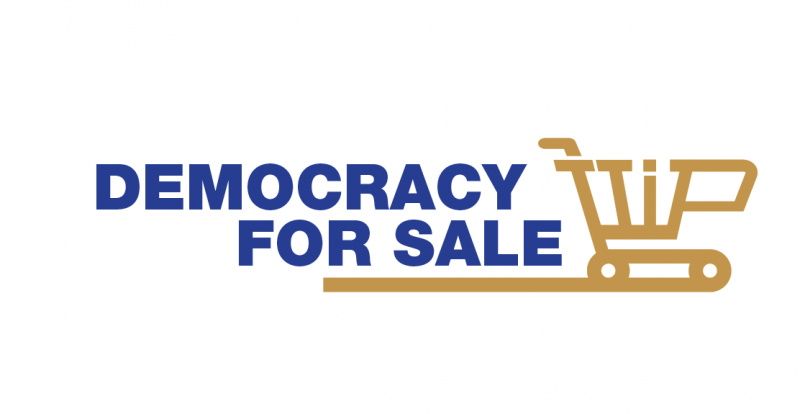
TTIP: The ultimate corporate trade treaty
There are many potential winners of the awards for the worst lobbyist on TTIP, probably the most corporate dominated trade negotiations in history.
There are many potential winners of the awards for the worst lobbyist on TTIP, probably the most corporate dominated trade negotiations in history.
In a few weeks the winner of the 'Democracy for Sale Awards' will be announced. A lobby group will be able to brag about its unmatched ability to have the EU negotiators work for them. It will not be an easy choice. The story of TTIP is full of examples, and they keep coming in. With the big trade deal between the EU and the US, it seems the power of big business has been massively overreaching.
Whereas the infamous investment protection provisions of the deal - be it in the EU or in the US version - provide stark proof of the intention on both sides to boost the political clout of corporations in the future, 5 of the 6 nominees at the awards have actually focused on a lesser known, but just as troubling aspect of TTIP: regulatory cooperation.
Regulatory cooperation is a wide ranging provision to remove trade obstacles. It is about rules that govern the delivery of services and about goods: these usually include huge differences in approaches from one side of the Atlantic to the other. What happens is the higher standards come under pressure, fuelling a race to the bottom. The attack on protective measures – for example on rules governing safe levels of pesticides, or banking regulations – will not happen over night. Regulatory cooperation is a long term project, that involves complex and opaque procedures, including many that offer business lobby groups a larger say in the decision making process.
"Co-writing regulation"
Regulatory cooperation is discussed in two different ways at the negotiations. There are talks on the rules that would guide all regulatory measures, horizontal rules, and there are talks on approaches in a specific sector.
Perhaps the single most provoking quote from an industry proposal on regulatory cooperation, comes from a document written by BusinessEurope and the US Chamber of Commerce over all rules on all sectors. In it, the two groups state unashamedly that they would like to secure the right of business to "essentially co-write regulation". You would expect the Commission to tell them very clearly that there are limits to what they can ask, but they don't. Quite the contrary. While the Commission representatives at the meeting underline that they are bound by rules that exclude an official commitment to give that kind of preferential treatment to business groups, the officials start considering manoeuvres that can make it a reality anyway. In the end, the Commission would table proposals that are strikingly similar to those of the two business groups.
Sectors
Such a turn of events clearly merits a nomination. In itself, it is scary to see that business groups are able to set the agenda for talks on horizontal rules, but actually, the Democracy for Sale Awards offer four more nominations also related to regulatory cooperation.
- On cars, the Commission is more than happy to work closely with industry, and has vowed that "any action proposed should be demand driven, based on input from industry." It doesn’t seem to matter that the car industry’s credibility has plummeted in the wake of the Dieselgate scandal.
- On chemicals, the approaches to approvals and bans of chemicals are fundamentally different in the US and EU. Here, the EU took a relatively cautious approach with legislation adopted a decade ago – despite pressure from the US administration and heavy lobbying by industry’s lobby groups on both sides, the American Chemistry Council and CEFIC, the European chemicals lobby group. Despite of this, we now see the EU basically making several joint proposals from the ACC and CEFIC its own, in the context of a trade agreement with the US.
- In pharmaceuticals, the same pattern is repeated, with the two biggest US and EU lobby groups joining forces to set the agenda for regulatory cooperation in their sector, and with success: again the Commission was happy to take their agenda forward at the negotiations. The side effects? Higher prices for medicines, and less transparency.
- On pesticides, the two biggest lobby groups in the field, the European Crop Protection Association (ECPA) and CropLife America (CLA), have fleshed out common proposals on regulatory cooperation, and despite the gap between the US and EU rules, with 82 pesticides banned in the EU but allowed in the US, their approach has been welcomed by the Commission. Also, the mere fact that the TTIP is under negotiation has made the Commission hesitate to meet its deadlines on hormone disrupting chemicals (endocrine disruptors).
Historic deal
There are other examples that didn't make it to nomination. For instance, the financial sector and cosmetics, in both cases with lobby groups from both sides working in close cooperation. There is plenty of evidence to support the claim that TTIP is a corporate treaty - written by and for corporations. There is hardly any other trade deal in history that takes corporate capture to the same level. At most trade negotiations you would find businesses lobbying their own governments to have them work for them. In this case, corporations on both sides do joint proposals and lobby both sides.
And the proposals are not just about changing specific rules. Much more worrying, they are about the corporate capture of the rule-making process: how rules should be made in the future, what should be done about the old ones, and how business groups can get to play a bigger part in decisions when creating those rules. Given how serious this is, in picking a favourite for the prize of worst lobbyist we are spoiled for choice.
